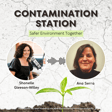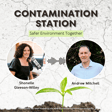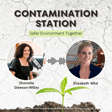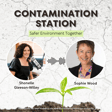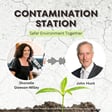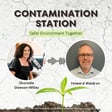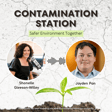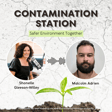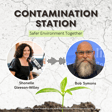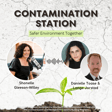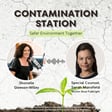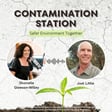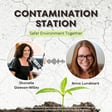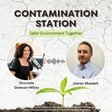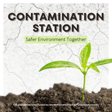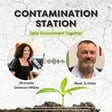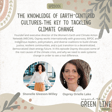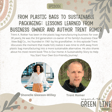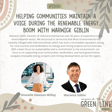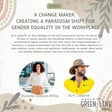Introduction to 'Contamination Station' Podcast
00:00:01
Speaker
Welcome to Contamination Station, safer environment together, a New South Wales EPA funded podcast. In these episodes, you'll hear from those working to implement contaminated land policies and procedures at the local level by sharing our stories, frustrations, wins and losses. Our aim is for this podcast to become a repository of information that will support those currently working to combat contaminated land and for those yet to come.
00:00:31
Speaker
Hello and welcome to this episode of Contamination Station, an EPA-funded podcast proudly launched as an initiative of the CRCB program.
Meet Peter Brennan: Environmental Services Coordinator
00:00:40
Speaker
I'm your host, Chanel Gleason-Willi, and our guest today is Peter Brennan, Coordinator of Environmental Services at a local council.
00:00:48
Speaker
The views and opinions expressed in this podcast are solely those of the host and the guest as individuals and do not necessarily reflect those of the New South Wales EPA or any other organization. In this episode, we're talking to Peter Brennan from local government in New South Wales about contamination and his experiences of how local government deals with contamination. Hi Peter, thanks for your time. Thanks Chanel. Thanks for having me.
Peter Brennan's Career Journey in Environmental Services
00:01:15
Speaker
So Peter, you've had an exciting career across various roles over the years. First as the Environmental Security Project Officer at Lake Macquarie City Council, then as Regional Environmental Program Manager at Hunter Joint Organization and Senior Program Officer at the New South Wales EPA prior to your current role in local government. Do you want to tell me a little bit about yourself and some of the highlights that you've enjoyed in your career across these different areas and various councils?
00:01:44
Speaker
So I guess I started off, I grew up in the Lake Macquarie area and I studied at the University of Newcastle, studying environmental engineering. And my career first started out at Lake Macquarie City Council as a cadet in sustainability. And that's where everything really sort of kicked off. It was really exciting being able to put
00:02:06
Speaker
a lot of the different things which I've learned at the Uni into practice, but more importantly, meeting people basically in what felt like the real world. It was a bit of an eye-opening experience. Seeing a lot of passionate people working in the field of sustainability was incredibly exciting. And yeah, within the first week when I was there, I sort of had to like during lunch, pinch myself a bit and going,
00:02:29
Speaker
oh holy crap like this is this is all the working life how cool is this you've got all of these people who get pretty much paid to do some really cool projects whether it's in biodiversity or climate change that kind of thing it's really exciting so for me i guess it was it was a confirmation of some of the things which i'd enjoy doing in terms of
00:02:51
Speaker
spending time outdoors and just the way you interact with the environment. There's a bit of a confirmation of like, okay, it's not just me who's sort of doing this and saying things in this way, but there are people who really value this and there's a broader aspect of society which values this.
00:03:08
Speaker
And what I didn't realize at the time is I was actually taking that quite for granted. It wasn't something which was consistent across New South Wales or Australia, but something which was and still is quite unique to the Lake Macquarie area as well. So some of the highlights, I guess, initially working through Lake Macquarie, yeah, it was meeting people, the different projects and the different things that can be working on and those exciting opportunities.
00:03:32
Speaker
But some of the big ones, just the really big pieces of work like climate change adaptation.
Challenges in Local Government Contamination Management
00:03:40
Speaker
So having the opportunity to work genuinely with the community in trying to address and tackle what is a wickedly complex problem. And from a local government perspective as well, that's huge to be trying to look at a worldwide problem.
00:03:57
Speaker
Yeah. Yeah. Oh, yeah. It's absolutely massive. It's like this worldwide problem. You feel like you're up against everything and you're trying to do it in such a small setting because we're working on like a sort of suburb by suburb setting. And you do get a couple of meetings and I remember a community member laughing at us going, what are you guys going to do anyway? You just cancel. And I was sort of like, oh.
00:04:18
Speaker
Yeah, I mean, there's a little bit of truth to that actually. There's only so much we could do in terms of what's in our control. And you start looking at the issue and start looking at like the quantum of the funding that's required and just the complexity and the science behind it. You're going, geez, like why are we?
00:04:34
Speaker
Why are we doing this by ourselves? Like we're doing it through a New South Wales funded grant, but it still feels like we're sort of going it alone. So you go from, you come back from a community meeting at like 9, 10 PM sort of thing. And you might be flicking on the telly and on the news, you're just seeing the political discussions and they weren't quite as advanced as what you would be hoping that can be demoralizing.
00:04:56
Speaker
But that was definitely a highlight. I think also through that role, just the exposure of the different projects we get. So, you know, that's where I started working in the contaminated land space. And that was sort of fortuitous. You know, you've got a senior officer in council who's actually very well qualified, knows really
00:05:20
Speaker
the space quite well, but you don't realize how much knowledge there is at the time until it sort of goes or you start talking to other people. But fortunately I got to learn a lot off that person and a couple other people within council. And I didn't realize how much of that knowledge I'd need to know because then they were seconded to the New South Wales EPA. And all of a sudden council goes, you've shown an interest in this sort of work. Why don't you come and manage the contaminated land database? It's only for a little while, just while this person's seconded.
00:05:51
Speaker
You're like, okay. Yeah, right. We'll give it a go. It's interesting. Why not? And then all of a sudden you're getting, you know, exposure to what is a contaminated land management framework, what is contaminated land in the local government setting, how it influences property owners, how it influences council.
Local Government's Role in Contamination Management
00:06:08
Speaker
And it was, it was really, yeah, exciting and daunting.
00:06:13
Speaker
Did you do anything around the lake itself? Does council extend into the lake? Cause I know that there's quite a, was quite an issue with contamination in the lake as well. Yeah. So council has a role in that, not just by themselves, but there were some areas where we'd work with New South Wales EPA, or you might be working with crown lands and that sort of thing. But a lot of that area council's responsible for maintaining, or it might be in council's care and control. So a good example of that would be say you're holding a festival in the park.
00:06:43
Speaker
and that park has a history where you wouldn't quite know it but there's been feeling of that site using a slag material from the nearby smelter and that's something which has happened historically at the time it wasn't known that it was going to be a contamination issue but it has really good drainage properties it's free we've got heaps of it stockpiled let's go and spread it around the area why not
00:07:12
Speaker
And that's where you start getting it popping up and it's in the foreshore areas. It's been used for forming those kinds of areas. So it does pop up in those public parks. So yeah, you might be holding a festival there, but then you have to go and assess the site going, okay, is there any exposure of this material? What are the risks? Is it suitable to actually be holding this event? And it's something which, yeah, there's a lot of time and resources, which has gone into that to make sure that those sites are actually safe.
00:07:39
Speaker
So is Lake Macquarie Council, along with a lot of the other councils kind of in and around Newcastle, in a fairly unique position when it comes to contaminated land because of its history? Oh, incredibly unique. So as I mentioned, like growing up in Lake Macquarie and Dora Creek, you take some of like the different settings in the area for granted. So you look at the power station, you see the stacks, you drive past that every day kind of thing, you think, yeah, cool, there's the power station.
00:08:05
Speaker
But as you start broadening your horizon and looking at the area of going, oh, okay, this is actually a unique industrial activity, which is occurring here. And you go to Newcastle and you look at the history there of how that's changed and just all the different works that have been undertaken.
00:08:22
Speaker
It is incredibly unique. There's been a massive hustle and bustle of human activity within the region and anywhere where there's been that human activity, there's contamination. It's inherent that that's basically what we do as humans. As we build, as we learn, as we sort of move through time, we've had these industries and we continue to have these industries which have
00:08:45
Speaker
impacts on the environment around us and they leave a legacy, whether that's current or whether it's actually just a legacy or whether it's something that's ongoing in time that we have to be aware of and manage appropriately. But yes, certainly a unique environment, certainly.
00:08:59
Speaker
Yeah, so you've gone from, I guess, forward-looking or looking into the future with your climate change position, which is a big portfolio, a big future, to dealing with historical issues and looking at the past and how it's affecting us
Evolution of Industry Knowledge and Legislation
00:09:14
Speaker
today. So complete 180 in terms of where your work's taken you. What could be some of the winds that you've seen around the, I guess, the contaminated land space in your time with local government?
00:09:28
Speaker
Some of the wins has been an overall like increase in knowledge. So it seems like the industry is still relatively young, but that there is a lot of expertise and there is a lot of knowledge which is present, but also that that knowledge and expertise has been accessed in a more efficient way. So we're seeing legislation which is quite strong. It feels like it's one of the most well
00:09:55
Speaker
understood subject areas in respect of, okay, this is contamination. This is how it should best be managed. This is how you would integrate it into your planning processes and that kind of thing. I guess that seems like it's been a big win. So coming in and learning about contamination is incredibly daunting at the start as an emotional topic, but you start looking through the information that's available and you start feeling settled and confident that when you're making a decision, it's appropriate.
00:10:23
Speaker
And I think that's just been the buildup of knowledge, which has been quite rapid and application of specialized skill sets within the industry, as well as having a good level of resourcing in planning and in regulation across state and council.
00:10:39
Speaker
But those wins have been dependent upon someone recognizing the risk that's there. So it's quite often that some of the wins are reactive. So something might go wrong or something happens as a precedent set in court, and then there's change, which occurs. But that is still incredibly positive that we take those lessons and we apply them in some reasonable setting to ensure that that risk is mitigated going into the future.
00:11:06
Speaker
I think one of those, and it's something which both you and I experienced, is recognition of the need for resourcing in this area, whether that's through, say, the Council Regional Capacity Building Program, as supported by the NSW EPA and previously the NSW Environmental Trust.
00:11:25
Speaker
Those have been massive wins, just in the sense of really putting local government under a microscope and going, okay, what are the ins and outs here? What's council responsible for and how can we improve these processes?
00:11:40
Speaker
And I guess it's sort of acknowledging what a lot of professionals have been dealing with for years. They've been managing the unique issues in contaminated land and they've been learning a lot along the way. And it's good to have that recognition or reinforcement that you have another agency or someone who has a resource and they go, okay, yeah, this is a real issue. We need to look at this.
00:12:04
Speaker
I think a lot of that's been an incredibly big win and it's certainly like an area where the application of that unique knowledge of some of the people that have been putting so much time into this has been pretty well captured and it is quite well applied.
The Role of Local Experience in Contamination Management
00:12:20
Speaker
I think they've been the wins, but it's still an opportunity to continue to do that. And do you think that that is quite localised for where those particular people have been working at that point in time?
00:12:31
Speaker
Yeah, definitely. So within each of the areas, I think you've got champions who that's definitely specific of, okay, how long have they been working here? What were they here for? Like those lessons have been learned through unique events in which that person's been in that role. They've gone through all that hard work, all that essentially emotional trauma potentially.
00:12:54
Speaker
And that's a sort of knowledge which you want to tap into and that's a sort of knowledge where, you know, you hear people saying we need to cut the red tape. We need to make these processes simpler and things like that. It's really the most effective way to do that and get the outcomes you want is by tapping into that experience which you have in those people.
00:13:11
Speaker
There are a lot of stories from these people across different councils and different areas, which they're absolutely incredible. That's what I found just going into the role at the Hunter Joint Organization of the Regional Capacity Building Program.
00:13:27
Speaker
Was one of the things you walk in and realize it's okay. There's actually there's some really experienced people here The question is just how do you capitalize upon what their story is what their knowledge is? Or just even just going to get people talking to each other to start with
00:13:43
Speaker
So, it feels like there's been some big wins just in terms of a common understanding of what the issues are in its own right and the best way to address complex issues. So, you know, some things like you see people take on the issue themselves. They feel like they, you know, say as a planning officer and counselor, you feel like
00:14:03
Speaker
Okay, I've got a lot of responsibility here and I really need to make sure I'm making the right decision. But sometimes I go to the extreme and that someone will hold off on that decision because they're not quite sure what the right decision is. But in that instance, they can have confidence in the process that's being set up to then demand, say, industry professionals who can be engaged to do this work or might already be engaged. Using that system and going, demonstrate to me why this is okay. Like, tell me the answer to this. And there's a really good process to be confident in that.
00:14:34
Speaker
Yeah, and I guess as an industry that is something that we've done really well, as you said, is it's very common knowledge as to how to find the right professionals and the people with the right certifications to give you the confidence. And they are available to local government, which is definitely a big win. And the industry, whilst it is still
00:14:56
Speaker
I guess relatively young, it has progressed quite quickly and there's been a lot of sharing of, of knowledge. I guess the, the private industry professionals have always been very, very willing to share knowledge and really push forward in the industry, which has been a great thing, but you're definitely right. Coming into the industry can be very daunting because there is just so much to learn and so much prior information.
00:15:23
Speaker
So what do you think are some of the biggest obstacles for local government when dealing with contaminated land? I think a lot of the biggest obstacles, the first one is just time. Councils are inherently very, very time poor and they're dealing with a variety of different issues, an incredibly high variety of issues.
00:15:45
Speaker
So one of my favorite stories which I do enjoy telling was just providing some assistance to a council just in respect to there's a hydrocarbon leak which has been picked up through complaints. Some residents were complaining of a hydrocarbon odor and there was evidence that there was hydrocarbon flowing through the ground and influencing surface water. You could see like the hydrocarbon sheen.
00:16:10
Speaker
So anyway, the investigation was being undertaken and we're looking at potential sources of this contamination. And there was a service station which was nearby. And in talking with this council officer, I was sort of getting an understanding of background information, what's going on, what's been.
00:16:25
Speaker
requested so far because at this time the underground petroleum storage system regulation has just been moved from New South Wales EPA to council. So, you know, it's new, it's council's sort of worrying about this big portfolio they've been presented with and then not having resources to adequately enforce it. So there's a lot of stress around that. But anyway, we go out to visit the site.
00:16:51
Speaker
and just having a walk around the surrounding area and trying to assess, okay, you know, where's the groundwater going? Is this actually coming from this site? I'm not sure. And there's a member of the community just walking across the road. He's walking his dog and he calls out to the environmental health officer who I'm with undertaking the investigation and they're talking. I was, okay, I'm going to continue having a look around this site. And, you know, I come back a couple minutes later and I was like, who was that guy?
00:17:21
Speaker
And the environmental health officer goes, oh, that's so-and-so. I helped him rehome his pig two weeks ago. Yeah, the landlord wasn't too happy with his pig living with him. The neighbours weren't happy either. So yeah, that went a bit back and forth. Anyway, we got the pig out to the ag farm at the nearby high school.
00:17:39
Speaker
And I just couldn't believe it, just seeing they're going, what is going on? So you're telling me you've gone like from a couple weeks ago, you're rehoming this P, you're doing other inspections as part of the POEO Act, and then you're being loved with this other report that there's potential leak coming from a service station, you've got hydrocarbon impacts, and you're about to basically get this highly technical report, you're going to have to review and understand for further action.
00:18:07
Speaker
It just blew my mind. There's just like, okay, great. How are we going to deal with this? Yeah, but it's awesome.
00:18:14
Speaker
Oh, that is just so crazy. So just quickly, can you tell me as an environmental health officer with the local government or in your previous roles with local government, just how broad is your portfolio of work that you need
Responsibilities of Environmental Health Officers
00:18:28
Speaker
to be across? I guess in a typical six month period, what types of things are you dealing with? Obviously not pigs every week. What is your typical role description or position description? Does it kind of just say you will do everything?
00:18:41
Speaker
Yes, as an environmental health officer, you've got the word environment in your name, so you will be doing anything and everything relating to the POEO and enforcement with anything in the environment. So you could be undertaking water quality testing sampling one day to then dealing with noisy roosters.
00:18:58
Speaker
or loose roosters and things like that around the area and then the next day you might see you going out to an explosives factory and undertaking an audit of some kind in that. It's just ridiculous. Anything that comes in, it just seems like someone has already spent probably their entire working career building up an expertise or niche knowledge and then they've written legislation around it because it builds all of this knowledge up. This is definitely how this activity is best to have been undertaken.
00:19:26
Speaker
And then an environmental health officer is expected to cast their brain into that times 20, go and understand the legislation, undertake a review. Is this being undertaken adequately? And they're at the coalface of it. They're going out there and they're meeting with community and they can be dealing with different kinds of compliance. So like they're getting, they can just be going out there, getting abused, coming back and rinse and repeat again and again and again.
00:19:53
Speaker
And they're doing all the hard work out there and while working in sustainability and we, you know, it can be, it depends where you are, but it can be a little bit detached. So you can be there going, oh great, we've reduced the, um, community footprint in emissions or we're doing this and you know, you'll get an award for that kind of thing. These guys are, yeah, they're doing all of this work.
00:20:15
Speaker
And it's not really well celebrated or acknowledged just how bloody tough it is. So, you know, you can be getting that and then they've got to look at a detailed contaminated land report. The proponents, they're going, what the hell is taking Council so long? Why are they spending so long looking at this? Well, you might have industry going, I could have bloody done this in three days. And Council's taking a couple of weeks around this.
00:20:36
Speaker
Because you're not only just dealing with a complexity of issues, but also just the whole quantity that's coming in. You know, you'll have so many matters referred to them, whether it's planning matters or just other environmental matters. They're just, there's always something to be done and it's always going to change. A good example of that is say, during COVID, undertaking inspections of premises to ensure that they're complying with the new COVID regulation, things like that. Who's going to do that? It's going to be the AHOs. So.
00:21:04
Speaker
You know, that programming work, you probably had, you know, forecasted for next year. Drop that. Don't worry about that. You're going to be doing this other thing now. Yes. And another thing that they would have had to have got their head around and the constant changing of the rules and regulations in that space. And as we all know, when you're trying to work on such uniquely different areas and different legislation, it takes you a while to actually kind of reset and go, okay, stop thinking about
00:21:29
Speaker
you know, P-O-E-O, and now I'm going to be thinking about E-P-N-A or, you know, whatever else I'm thinking about and to actually reset and go, right, where am I? It always takes time. So yet that would be a very difficult role, I think.
00:21:44
Speaker
Yeah, I think it is. And you're always, you're enforcing the legislation. So you become intimately aware of what its shortcomings are and where some of the improvements can be. So there's an element there as well though, where there's sometimes a disconnect. So whoever's writing the legislation might not necessarily be talking to the person that's then implementing it. And you see that time and time again. So there can be a lot of like frustration and resentment that comes with that because you can be going, okay, I'm doing this. And then next week they go,
00:22:14
Speaker
Okay, there's an amendment being made to this clause and you just have to deal with it. It might flip your work on its head in the way and like the approach that you take, but it's something you've got to deal with. And that can be really frustrating. And there's a lot of people who, yeah, you can feel resentment around that sort of work. And I think it's valid as well. Um, especially when they're having to answer questions on the spot from the community. And I guess try to look like they know what they're talking about.
00:22:44
Speaker
Yeah, exactly. It's either here or there, but these people aren't paid the same as other people are in different industries and fields. I do feel like these guys are underdone for the work that they're doing and the stress that they put up with. They're not making a massive killing. They're not going to be retiring early, that kind of thing. It's really hard work.
00:23:04
Speaker
So with your extensive experience and I guess looking at what roles you've done, but also the ones you've come in contact with, like what we've just been talking about, what would you like to see done to overcome some of these obstacles? I guess in local government as a whole, but also with the lens of contaminated land management.
Leveraging Local Government Expertise in Legislation
00:23:23
Speaker
I think the number one thing is acknowledging and taking advantage of the knowledge that's been built within the local government area and applying that to state legislation, to federal legislation. Acknowledging the experiences and the stories of the people who have been working in these fields for a very long time and really empowering those to benefit everyone else.
00:23:46
Speaker
As a community, we in general have a range of professionals who work in different fields. You wouldn't ever expect that you're going to have one person who, you know, is going to be the knowledge holder of everything and they're going to determine everything. As a community, everyone has different roles and we all come together to function as a community.
00:24:06
Speaker
To best do that and to best improve and change that, you tap into those experts in those specific fields and you look at, okay, what's the experience been so far? What's the stories? What are some of the things which you've noticed? How do we best use that to move forward? And I mentioned just before, just, you know, the whole
00:24:24
Speaker
element of cutting red tape, making planning easier, that kind of thing. You see these projects coming all the time. But to really understand those planning issues and what the constraints are, it's best understood by spending time and listening to the people who've been working in this area for 20 plus years and applying that knowledge and learning and really taking advantage of it.
00:24:48
Speaker
Yeah. And do you have any ideas or have you seen it implemented anywhere that you've seen work really well to capture that knowledge? That's a good question. I think you see it happening at a local scale in a small quantity all the time. So where you might be having programs where you're engaging with the community and empowering them to be telling a story or making that difference. It can be a simple thing as, you know, working with your local Landcare.
00:25:12
Speaker
and listening to people who've been looking after a site for 20 plus years as to what the needs of the site are or why it might have changed. That then informs the scope of works, your program and how you're going to treat that site into the future. Something like that can have a significant change. And the same thing happens through these programs. So I think a good one is the New South Wales EPA Council Regional Capacity Building Program. The lessons learnt through that.
00:25:37
Speaker
were quite well shared across different parts of, say, New South Wales EPA with industry and the like to really progress the conversation and understand what the needs of the different stakeholders are. One thing that I noticed with the CRCB program was that at the beginning of the program, and you were part of this program, at the beginning, we weren't meeting up in person and having, I guess, discussion sessions, workshops and that kind of stuff. It was all either via email or official meetings.
00:26:07
Speaker
And I felt like now towards the end of this program over the last, I guess what year and a half, two years that we had a lot of face to face workshop sessions, multi-day ones. And that really accelerated the program to the point where I think we're actually.
00:26:25
Speaker
generating a lot more of the written resources and the guidelines and pollination of ideas was just happening so much faster than what it did at the beginning of the program. So what I saw was that that seemed to be the best way to actually get a program like this up and running and actually, you know, doing what it's supposed to do.
Collaboration and Communication in Contamination Programs
00:26:43
Speaker
But from your unique perspective, what did you see? What did you think about that? Was it a good thing to do or didn't really change anything?
00:26:52
Speaker
No, I definitely agree. I think the conversations weren't happening. And so again, that's, it's something where it wasn't happening with councils. So councils within a region weren't quite talking to each other. So facilitating that was amazing. And then you lift that up and apply that to the program itself as well. And then the same sort of thing starts occurring. You're having these conversations and things start moving quicker and you get a greater appreciation or understanding of what the issues are. Or you might look at the scope of the program and what it's trying to achieve and going,
00:27:21
Speaker
Okay, actually, is this adequate or is it just asking more questions now? And that's fantastic. So it happens at like the different sort of scale of you could be working with councils and getting them to talk to each other. And then there's the irony that, while we as ourselves matter in this program need to be talking to each other as well to better understand these issues and come up with an approach moving forward.
00:27:40
Speaker
But i think one of the big things which the program sort of a cheese is in the title itself and it's around capacity building and. I don't think it's any coincidence that you know okay three years on into the program it's you're saying this change you say the dynamic change you say okay this is sort of coming together.
00:27:59
Speaker
I think it's a question of the endurance of this sort of work of, okay, what is capacity building? How long does it actually take? And to drive a significant change, can you look at it in terms of a program of, okay, it's going to be zero to three years. And at this point, we're going to be that.
00:28:16
Speaker
I don't think that's quite how a lot of these sort of programs work or find success. I think for something which is driving a massive change that you've got to be committed to it. And I say that not just in respect to contaminated land, but into other works as well. So, you know, it could be climate change adaptation, or it could be biodiversity, or it could be anything where you're working with stakeholders. And if you're committed to making this change,
00:28:39
Speaker
you acknowledge that it's going to take quite a lot of time. Things will be changing in the background, whether it's politics, whether it's a resourcing, or just anything, but you're building that momentum over time and you're building that change, essentially. I think that's some of the things I just saw in one of the
00:28:57
Speaker
Big takeaways I got from working in climate change at Lake Macquarie was, okay, yeah, we were working under this grant funded program, but the conversations with the community and the people that were involved that didn't stop, it was just the starting point. Okay, great, we've developed an adaptation plan. Now's the biggest stuff. What are the next steps? And it's a continuation of the conversation throughout time.
00:29:17
Speaker
It's really interesting that you talk about in that way, because it's actually something we spoke about, I spoke about to Anna Lundmark in my conversation with her, was around that change management piece and how she went and did some training and became certified as a change practitioner.
00:29:35
Speaker
And it's just, yeah, I guess it is such a big component of these types of programs that is probably not given enough emphasis. That change, it does actually need to have the focus put on the fact that change is slow or can be slow. And there are steps that need to happen to enable change to actually happen when you're working with people. So yeah, it's interesting that you bring that up as well.
00:29:58
Speaker
Yeah, it's definitely interesting. And it's also just acknowledging like, while you might be in a position where you're sort of running this kind of program, you're still learning yourself. And there's a lot of knowledge you're extracting as you're going through this sort of process. And there's learnings from trying to implement different things. Some things which you do might be successful, they might not. But the important thing is understanding why or why it didn't work. And then being able to apply that as you're moving forward. And I think that's just one of the big cases like,
00:30:24
Speaker
I remember say one of the starting points where it's like, okay, we need the contaminated land policy and there's a policy sort of developed. And then you start looking at, okay, how should a policy actually be written? How should this change? How's it going to interact with the other components within the state government as well? The discussion of how many pages it should be. Should it be three or should it be 40? Exactly.
00:30:47
Speaker
That is still going on that discussion. Oh, I bet it is. It will continue as well. Things like that. And then, you know, oh, okay. Well, every council needs to have a contaminated land database. And then it's, okay, here we make sure we're talking the same language and we're going to be describing these things the same. That's a lot of work. Like what's, what's the best way to do that? There's a lot of lessons in just trying to unpack that and build those.
00:31:10
Speaker
There's things like that where they, they do take time to really best understand it. And it's, there's different approaches in there, which, you know, previously weren't available to use. So, you know, maybe there's, you can use data aggregation and machine learning and that sort of thing now, which you couldn't before. So you've got all these different things floating around, which just influence every build. And that is changing in time as well.
00:31:35
Speaker
Hmm. So you touched on the planning process before and about how that is a big component when you're dealing with contaminated land at the local level.
Training and Support for Planning Staff
00:31:44
Speaker
So do you have any case studies that you can share or anything that you might've done differently in your time when it comes to understanding the planning process or implementing management of contaminated land through the planning process?
00:31:58
Speaker
I think the big one is it's the conversations with the planning staff and building their confidence and understanding of contaminated land planning and management just in general. So it happens and it will continue to happen again and again, where planning staff will be dealing with like a planning matter, and they might have something to do with contamination, but they're not sure what to do, or they might not know what the system or mechanism is in place.
00:32:26
Speaker
One of the things which the CRCD program did really well was having a resource there for those people to reach out to. And what is really required, I think, is just having that knowledge there and the ability to have a conversation with someone.
00:32:42
Speaker
I think one of the things I do differently those through that program is like while we had guidance and materials available and you know you have a training session with the planning staff is I'll probably be more routinely having conversations with them. Just doing it more regularly and ensuring you're doing it every single year as well and just factoring that in that there is this turnover in like the staff at council. The knowledge takes time to build up and they might be dealing with different complexity of issues each time with the planning matter.
00:33:10
Speaker
So I've had like planning stuff, you know, approach and talk to us about like, what do you think about this? I was looking at this report and they're using like, this was their methodology for getting a ground sample. Is that appropriate for this contaminant and this kind of thing? And you sort of got to hang on.
00:33:27
Speaker
You're asking really detailed questions about it, which is great, but you're really trying to answer, like solve these things yourself when you don't need to. We've gone through this process. You've got a certified consultant on board that you can rely on under that scheme to go back and get them to demonstrate the question and like have the conversation with them as well.
00:33:43
Speaker
So, building up the ability for people to be confident in asking questions and asking for a consultant to demonstrate why this is correct and validating their questions and concerns. They're real concerns, they're real questions. That's excellent. Really need to validate that so they can ask it in a way that it gets solved appropriately.
00:34:05
Speaker
I think the other element as well, it's difficult within planning, is having planning staff across different councils, having a joint understanding and talking the same way around contaminated land and their understanding of it. So while you're looking at planning staff on their own, they're going to be influenced by like what information do they have available? So do they have a contaminated land register?
00:34:27
Speaker
Is there, you know, consistent descriptions and classifications for Contaminated Land? So they know, okay, if it's this, this is kind of what I need to do. And this is how I would talk to someone about it who has concerns around it. I think that is still an issue at the moment as well, which probably still needs a bit of love and attention, and it will continue to in time. The other element as well is just in respect to, I didn't realise how little councils are using the site auditor scheme. Oh, really?
00:34:57
Speaker
Yeah, like surprisingly going, okay, how often do you push back and just say, you're going to need to engage the site order to do this? The answer to that was inconsistent across a lot of the different councils. And you find that those who have a better, that you can say there's a really high understanding of contaminated land, they use that scheme quite often. Others tend not to.
00:35:22
Speaker
So that's interesting, the more knowledge they have, the more they use it and the less they have, the less that just seemingly doesn't make sense. But is it possibly because councils or council staff who don't have very much knowledge in that space are a little bit afraid of pushing their community towards auditors because of this perception around the high cost involved?
00:35:44
Speaker
Yeah, that's definitely one element to it. I think sometimes it's, they feel like, okay, I can answer this question myself, or I should be able to answer this question by myself. And yeah, we don't want to go down the audit route because it's going to cost more money. So we'll try and avoid that. Right.
00:35:59
Speaker
In reality, knowing or engaging a site order as early as you can is going to streamline that planning process for the proponent. And it's probably going to cost less because the actual application itself isn't going to take as much time to review and council is going to be more confident because you're utilizing the scheme and you've got a higher confidence that the outcome is going to have a lesser impact to human environmental health because you're going through this sort of quality assurance process.
00:36:27
Speaker
Yeah, yeah, definitely. Well, thank you so much for being my guest today, Peter. It has been a pleasure talking with you and great to catch up after such a long time. I've loved having our chat today. Thanks so much for having me. It's been a lot of fun.
00:36:40
Speaker
That wraps up this episode of Contamination Station. Thanks for listening. You've been listening to Contamination Station, Safer Environment Together, an EPA funded podcast hosted by Chanel Gleason Wiley. We hope you've enjoyed our chat and been inspired to continue working towards a safer environment together. We would love for you to stick around for the next episode. So keep those headphones on, grab another cuppa and settle in for more insightful stories.

